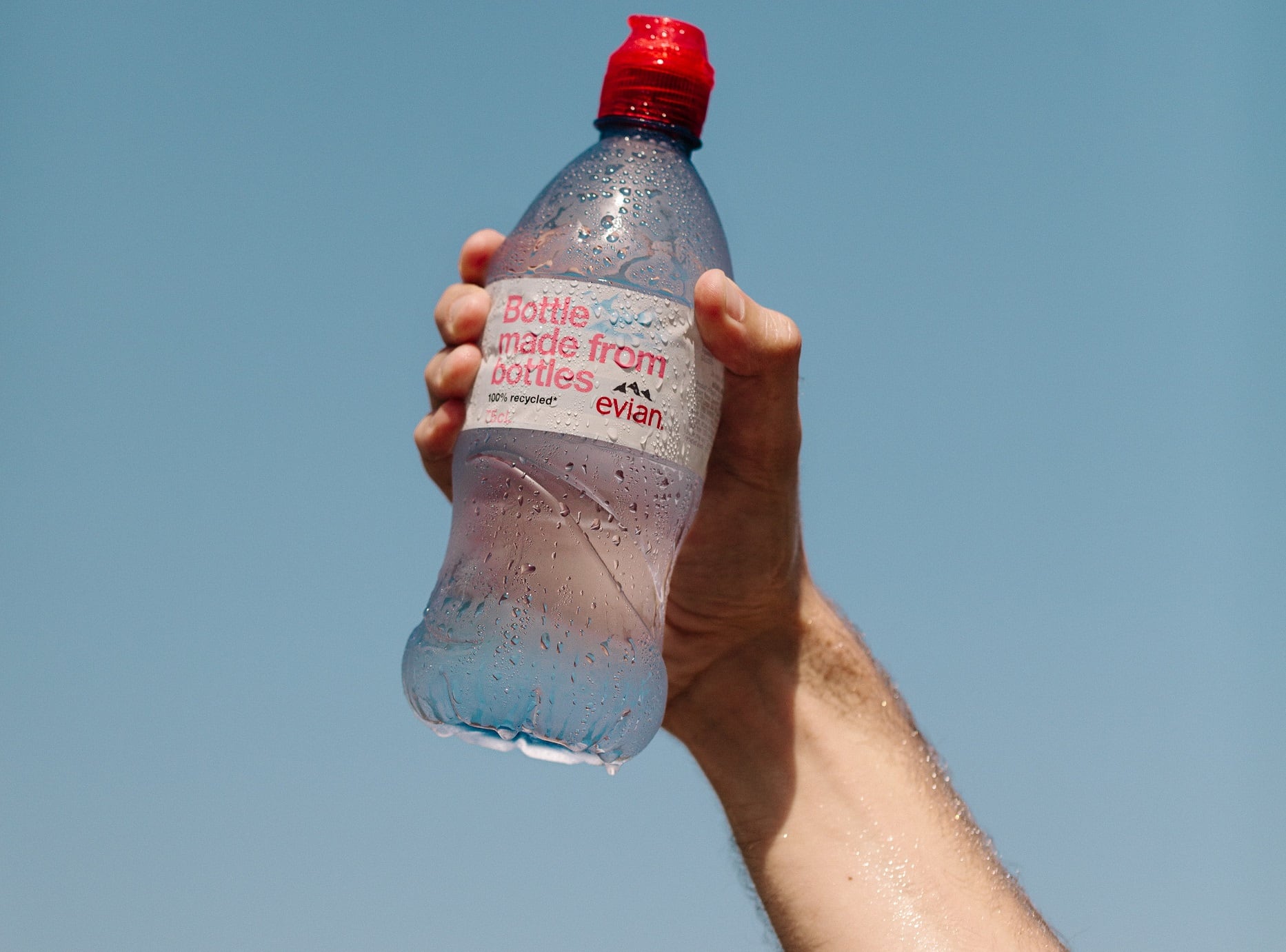Upping rPET content helps brands move towards a circular economy: reducing the amount of virgin oil-based plastic used and instead considering plastic waste as a valuable, reusable resource. Consumers, meanwhile, place increased importance on sustainability: and are particularly conscious of the impact of plastic bottles on the environment.
A number of brands – both big and small – are increasing rPET content: either as a percentage of the bottle or creating bottles entirely from recycled content. But transitioning to rPET is not straight-forward.
While the technology is there, availability of high-quality, food-grade recycled plastic has been a challenge for the industry – a problem it hopes to address by encouraging recycling and investing in technology. Caps and closures, meanwhile, are not included in most rPET commitments. And what do consumers think of these new 100% rPET bottles once they get them in their hands?
Availability of rPET
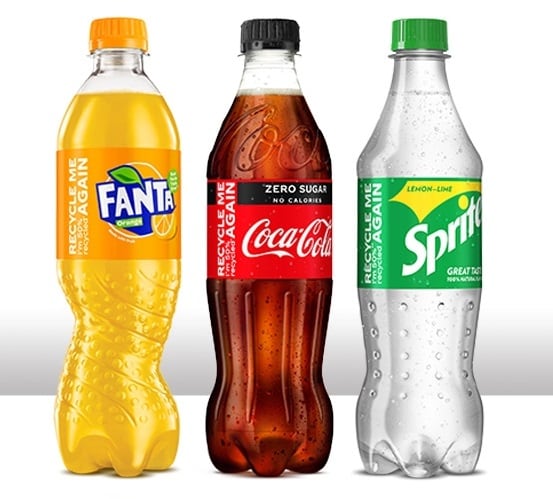
This week Coca-Cola Great Britain announced that all plastic bottles in its core brand portfolio – including Coca-Cola, Fanta, Sprite and Oasis – are made with 50% recycled plastic. This equates to removing more than 21,000 tonnes of virgin plastic, according to Coca-Cola.
And 50% rPET will be extended to the full portfolio by the end of the year.
However, with Coca-Cola’s smartwater brand using 100% rPET: the question is why Coca-Cola can’t reach 100% rPET for its core brands either.
“One of the key challenges the industry currently faces is that there isn’t enough food-grade recycled plastic locally available in the UK to switch to 100% rPET across our entire range,” explained Jon Woods, General Manager, Coca-Cola Great Britain.
“There needs to be more high-quality recycled plastic produced, so it’s vital to make sure we collect more bottles in an efficient way, and stop it ending up as waste.”
Coca-Cola is investing in rPET technology to increase availability of recycled PET.
For example, it has extended a loan to the Netherlands' Ioniqa Technologies to support the development of PET upcycling tech, which uses depolymerization to recycle plastics of different colours and qualities into purified building blocks which can then be made into clear, high-quality PET.
Coca-Cola is also redesigning bottles so they need less PET in the first place. Packaging weight has decreased by 27% since 2007 – and the amount of plastic in a Coke bottle has almost halved over the last 20 years.
Coca-Cola European Partners has also entered into a multi-year supply agreement with Loop Industries to purchase recycled Loop PET across Western Europe, allowing it to accelerate the increased use of recycled content in its plastic bottles.
And in 2012, Coca-Cola helped established the UK’s biggest bottle-to-bottle plastic reprocessing facility in Lincolnshire to reprocess bottles.
Coca-Cola supports the introduction of a Deposit Return Scheme, and has also updated labels to encourage recycling. But it acknowledges there is ‘no single quick-fix solution’ when it comes to increasing recovery and recycling rates.
Sourcing rPET locally
Nestlé Waters UK committed last year to make every Buxton bottle from 100% rPET by 2021. It has already launched 750ml and 1L bottles made from 100% rPET, and the rest of the range – currently made with a minimum of 20% rPET – will follow by the end of 2021.
It champions the properties of rPET, saying the “high-quality recycled material retains the same all-important properties as PET, resulting in a product that is lightweight, durable, resilient and still 100% recyclable.”
Last year the company noted that the domestic UK supply of recycled PET was still relatively limited, with rPET used for Buxton bottles at the moment being sourced from outside the UK. Today, however, it has announced a new partnership with Biffa, a waste management business, to obtain rPET from British recycled plastic.
The rPET for Buxton bottles will come from Biffa’s new £27.5m state-of-the-art plastic recycling facility in Seaham, County Durham. The plant has the capacity to process the equivalent of 1.3bn plastic bottles each year and will supply recycled material to Nestlé Waters’ Buxton factory as of next year.
“The partnership will enable Nestlé Waters UK to significantly reduce the amount of virgin plastic in circulation and lead the shift to using high-quality food-grade recycled PET in the UK, which today is sourced from Europe,” notes Nestlé.
How do consumers react to 100% rPET bottles?
UK bottled water brand Highland Spring started trialling a 100% rPET bottle back in 2018, launching it officially in 2019. In its first year, more than 10 million eco bottles were sold.
The brand is now using this eco bottle in 500ml, 750ml sports cap, Wild Life kids and 500ml sparkling bottle formats.
Having had a 100% rPET bottle on the market for more than a year, Highland Spring has had a chance to gauge reactions from consumers and says this has been very positive.
"Highland Spring’s eco bottle range uses quality rPET to ensure consumer are still able to see the purity of the water," Nichola Grant, channel marketing manager, Highland Spring Group, told this publication.
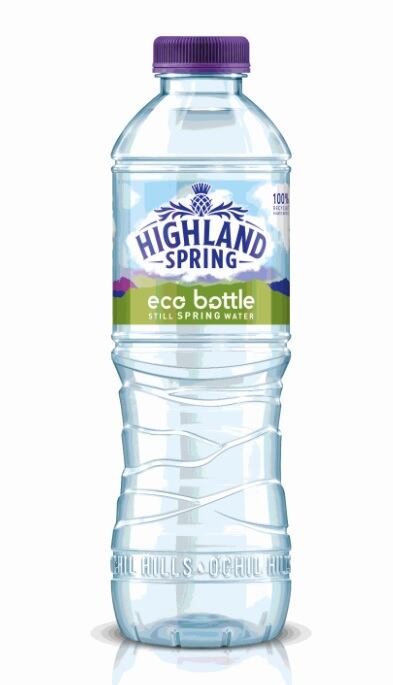
"That said, there are inevitably some slight differences in colour and texture between virgin PET and rPET plastics, but during Highland Spring’s successful 2018 eco bottle trial the results showed that shoppers responded extremely well to the 100% recycled plastic eco bottle, with no negative reaction to the appearance of the recycled plastic.
"Only one in 10 shoppers noticed a difference in the eco bottle as a recycled material, and even when shown the eco bottle alongside a standard Highland Spring bottle, only 35% of shoppers noticed a slight difference in the plastic appearance."
As with other companies, Highland Spring notes the challenge of obtaining enough rPET to extend the packaging format across its entire range.
"While fully embracing the opportunity to develop a truly circular plastic economy in the UK, Highland Spring remains conscious that there is still a lot of work required to increase recycling rates, recycling infrastructure and ensuring consumers understand that all PET plastic bottles can be recycled," said Grant.
"Therefore, Highland Spring’s environmental strategy is focused on increasing the recycled content (rPET) of its bottles, and making sure everyone knows that every single Highland Spring bottle can be recycled. If all the brand’s bottles were recycled after use the plastic could be used again and again, there would be minimal energy used and no waste going to landfill.
"Highland Spring is continuously working towards the increased use rPET in its products and the introduction of a well-designed Deposit Return Scheme in England, Scotland and Wales will help with the availability of good quality recycled materials. However, the DRS is only part of the solution which needs to be part of a broader plan of resource and waste management.
"As such Highland Spring continues to work together with the industry to understand the best strategies to reform business systems, create structural change and support consumer behaviour change initiatives that will reduce littering and increase recycling rates."
New 100% rPET products hitting shelves: Evian & Naked Smoothies
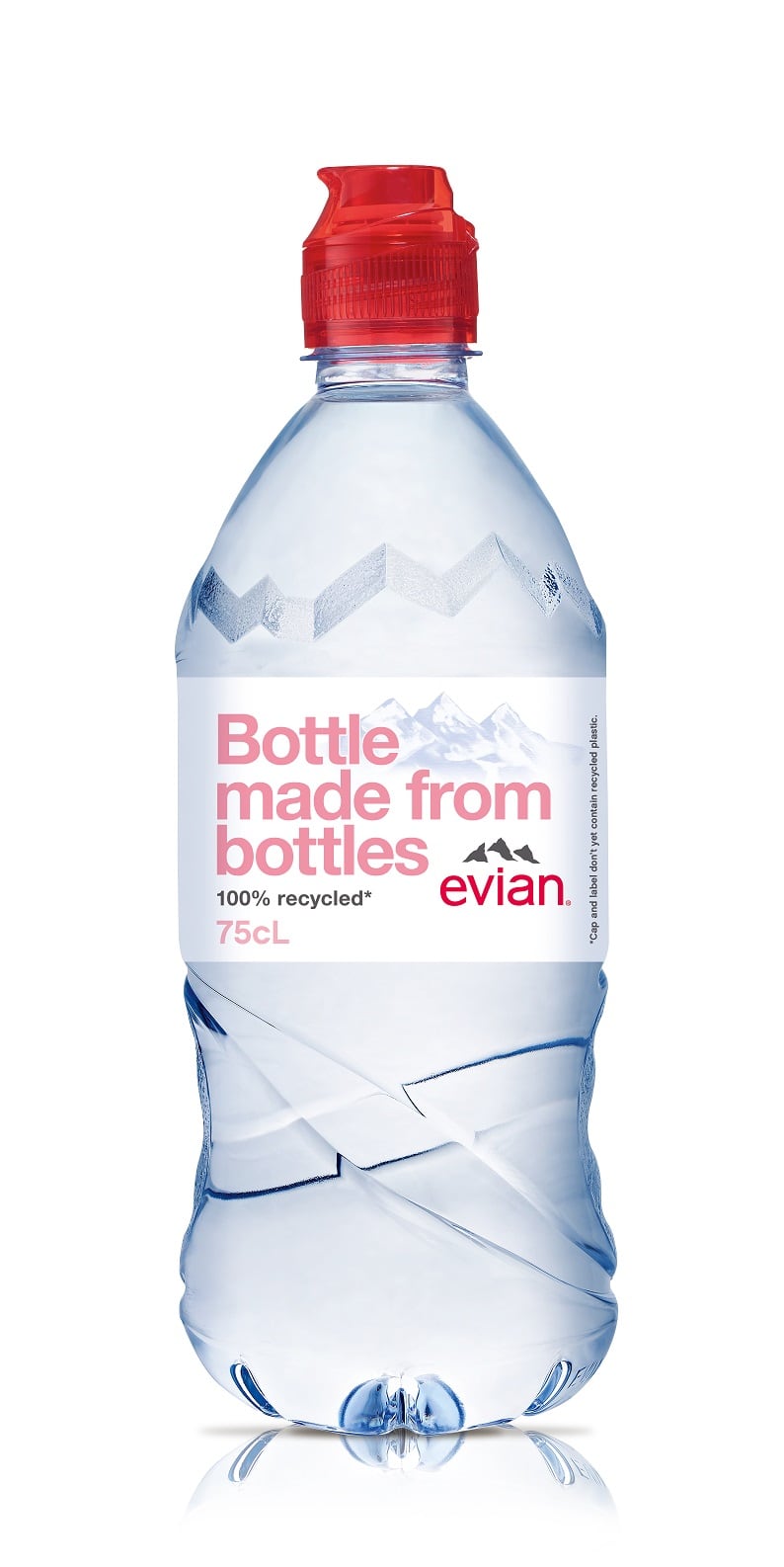
Other recent 100% rPET commitments come from Danone bottled water brand evian and PepsiCo smoothie brand Naked.
Back in 2018 evian committed to make all its bottles from 100% rPET by 2025, creating a completely circular approach to plastic packaging.
As part of this journey, it has this week introduced 100% rPET bottles on its best-selling SKU, the 750ml bottle, which will be distinguishable with its ‘bottle made from bottles’ label.
This means that around 40% of evian's UK range is now made from 100% rPET, with the rest to follow by the 2025 deadline.
The carbon neutral brand estimates that a 100% rPET reduces carbon emissions in production by up to 50%, compared to bottles made from virgin plastic.
In the UK, it is working with sustainability and behaviour change charity Hubbub with recycling-on-the-go trials in major cities with the aim to increase recycling rates out of home.
And it is also partnering with technology companies such as Loop Industries for obtaining a sufficient amount of high-quality rPET.
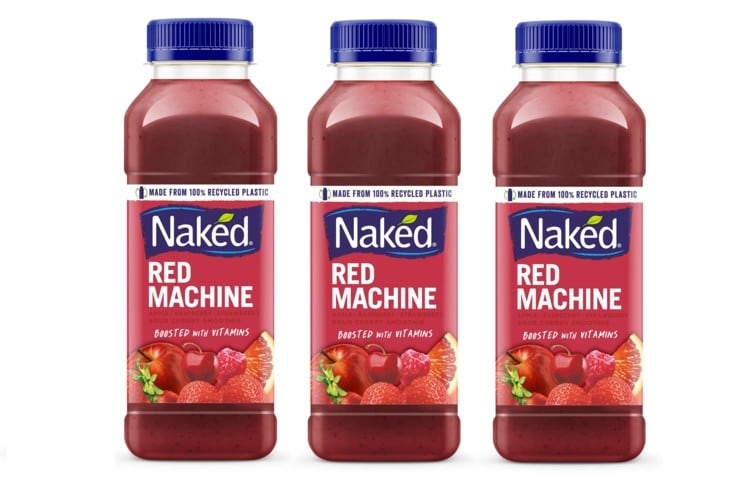
Last month PepsiCo’s Naked brand started rolling out 100% rPET bottles across its entire smoothie range in the UK, including Naked Machines, Naked Lean and Naked Zing.
The recyclable bottles are accompanied by a new, modernised label refresh to emphasise the use of 100% recycled plastic.
Like Highland Spring, Naked notes the need for rPET bottles to have similar properties to traditional PET bottles.
"One of the key challenges we faced was making a bottle that was as close as possible in colour to the virgin plastic one," Charlotte Ashburner, senior marketing manager for PepsiCo, told this publication.
"Recycled plastic is typically more grey than virgin plastic. This is particularly tricky for a smoothie brand as it can make the product look less exciting/vibrant in colour to our consumers. Nevertheless, we are proud of our new bottles and are constantly looking to continue improving our sustainability efforts.
"We know people remain mindful of the impact of plastic packaging on the environment and research has found that consumers are looking for ways to make a positive difference by supporting brands that address causes they care about."
How many consumers actually recycle in the UK?
The critical need, however, for all recycled plastic commitments is to have more recycled material available to use. And the most straight-forward way of doing this is to encourage consumers to recycle so that old plastic can be turned into rPET material. And despite an ongoing and well-publicised backlash against plastic bottles, Greenpeace says plastic bottle recycling rates are ‘stalled’ at around just 59% in the UK.
However, recycling among UK households is ‘increasing and becoming more consistent’, according to the Recycling Tracker 2020 released by UK initiative Wrap (The Waste and Resources Action Programme) this week (the tracker covers all recyclable materials and not just plastic bottles).
Almost nine in ten (87%) UK households say they ‘regularly’ recycle, in contrast to only just under one in ten (9%) who recycle ‘occasionally’ and one in 25 (4%) who recycle ‘rarely’ or ‘never’.
The main motivations given for recycling are ‘it’s the right thing to do’ (cited by 69% of UK households), habit/routine (62%), to do ‘their bit’ for the environment (62%) and to avoid sending waste to landfill (59%).
This is followed by three specific environmental motivations – to preserve the planet’s resources (51%), to help address climate change (48%) and to reduce their own carbon footprint (44%).
Wrap also notes an increase in positive environmental outlooks, with a significant increase in the proportion agreeing with the statement ‘I am prepared to make lifestyle compromises to benefit the environment’ (from 64% in 2018 to 72% now).
However, “It is not clear yet if this is a short-term response to 2020 or a sustained trend,” says Wrap.
And Wrap also notes an increased awareness and motivation for plastic bottle recycling: 26% of respondents said they had been recycling plastic drinks bottles more in the past year: either because they had started recycling them for the first time or because they now do so more consistently.
Picture credits top to bottom: Danone; CCEP; Highland Spring Group; Danone; PepsiCo

